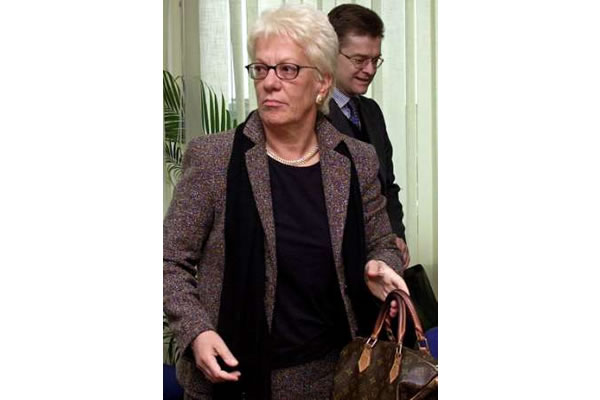Home
PAINFUL FOR THE PROSECUTOR, SHAMEFUL FOR SERBIA, BH AND THE WORLD
Carla Del Ponte is not ruling out the possibility that some parts of the international community would want some fact to remain hidden and that not everyone has an interest in bringing Karadzic and Mladic to The Hague. The results of the Tribunal's work must be used to promote long-term stability in South-east Europe. The European Union should play a special role
 Carla del Ponte, chief prosecutor at the Tribunal
Carla del Ponte, chief prosecutor at the Tribunal In her speech delivered today in Berne, Del Ponte sums up the results the ICTY has achieved so far, inevitably noting the fact that Karadzic and Mladic are still at large: this is "painful for the Prosecutor" and "shameful for Serbia, BH and the international community." The Serbian army, in Del Ponte's view, reamins afraid to contront the truth that Karadzic and Mladic might disclose. "I also can't exclude the possibility that some parts of the international community as well may prefer to keep certain facts hidden. Not everybody in the world is interested to see Karadzic and Mladic in front of the ICTY."
At a conference on peace and human rights the Swiss Ministry of Foreign Affairs this year devoted to South-east Europe, Del Ponte stresses that the countries in South-east Europe must take on and finish the job that the ICTY started, to determine the facts and administer justice, in order to avoid the risk of new conflicts in the future. She listed several pre-requisites for reconciliation and future stability in the region. First, war crimes trials should continue before domestic courts when the tribunal finishes its work in 2010, and second, "a formidable wealth of documentary evidence accumlated by the Tribunal… should be made available to everyone in the region and processed into history books, manuals and documentaries." "The process of creating the collective memory should not be left to those who deny the truth and create myths," the prosecutor added.
Del Ponte reminds that one third of the population in Serbia considers that no crime was committed in Srebrenica, and a huge majority rejects the idea that genocide was committed there, despite the factual findings reached by the Tribunal. She also notes that the crimes committed in the course of and after Operation Storm in Croatia were only marginally mentioned when the anniversary of the operation was celebrated this year.
Del Ponte is convinced, however, that two trends that characterize modern society will help to achieve future stability. First, because of the quick flow of information, it is much more difficult to skew facts nowadays. Second, the international community no longer allows the crimes to remain unpunished. Del Ponte furthermore stresses the fact that the European Union has played so far and should play in the future.
“The European Union is confronted with a dilemma: either to integrate the countries of the Western Balkans before a genuine reconciliation process has taken place and risk to import conflicts, or to wait for a solid peace to be established there, but that may mean decades and nobody can predict what can happen in the meantime… The European Union has seemingly opted for something in-between."
“As long as a country remains a candidate, the EU has the power to force reforms," Del Ponte says, reminding that "serious improvements” in the cooperation by Croatia and Serbia-Montenegro in the past 18 years “are definitely the result of a well-articulated and consistent EU policy."
Linked Reports
- Case : Miscellaneous
- 2005-07-06 CAREFUL WITH THE WORD "VICTIMS”
- 2005-06-29 SENSE PRESENTS TWO NEW FILMS
- 2005-06-23 DISGRACEFUL IMPUNITY
- 2005-09-21 ARRESTS DEPEND ON GOOD WILL, COOPERATION AND COORDINATION
- 2005-11-11 SESELJ, STANISIC, SIMATOVIC AND MARTIC TO BE TRIED SEPARATELY
- 2005-11-16 LJAJIC DENIES RUMORS ABOUT SURRENDER TALKS WITH MLADIC
